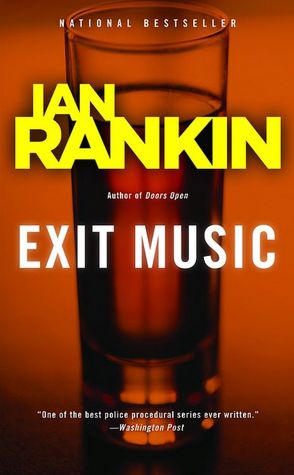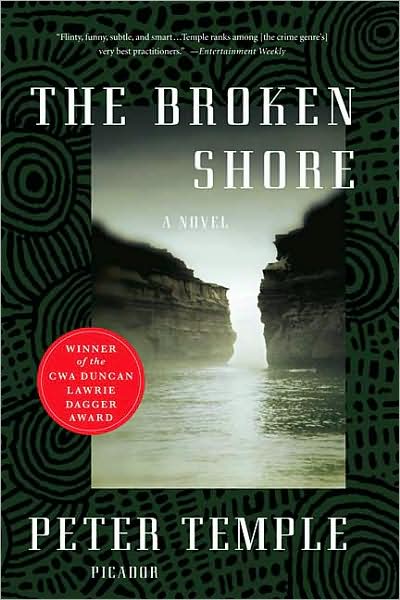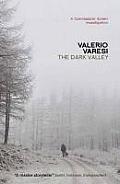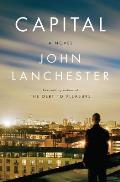Done reading.

I bought the first 8 in the series to slowly catch up from the beginning.
Some nice expressions:
- Perish the thought.
- Slay us with an insight.
- Bully for you.
- Fancy a fry-up?
- You taking the piss?
Done reading.

I bought the first 8 in the series to slowly catch up from the beginning.
Some nice expressions:
Done reading.
Two books by the Australian crime fiction writer, Peter Temple: The Broken Shore and Truth. Here’s a good review of The Broken Shore and here is one of Truth.
One point to emphasize is Temple’s gift at dialogue. I haven’t read such high-quality and truly authentic exchanges since Lush Life by Richard Price, he of The Wire fame (5th season). And that’s not only because of the ubiquitous use of Australian slang which is entertaining by itself, but also because of some of the dialogue which is subtle and smart, raw and visceral, and steadily dripping with sarcasm. The elliptical story-telling is superb as well and the characters are sublime. Especially Truth has some good story lines of discrimination against aboriginals, father-son conflict, urban planning, etc., all expertly woven into the plots.
Needless to say, the dictionaries of Australian slang in the back of both books come in handy.
A few quotes:
 |
 |
Here’s a news story about a mystery story that became mystery and then turned into a messy story.

Apparently, the German publishing house S. Fischer will shortly release a book called “Der Sturm” (The Storm) by Per Johansson written in the style of popular Scandinavian crime fiction. The book revolves around the particularly bestial murder of a German journalist and editor in chief of a major newspaper.
What makes this particular publication so intriguing is that a German daily, Die Welt, did some in-depth sleuthing and found that the apparent author Per Johansson does not really exist. This despite the fact that the book’s cover features a photo of the ‘author’ and describes him as living in Berlin and working as a web designer. It also lists the name of a woman who ostensibly translated the book from Swedish to German. Until recently, the S. Fisher publishing house even carried a fictitious bio for Per Johansson on its web site. That bio has since been replaced but is still preserved in the publisher’s 2012 Autumn “Rights Guide” along with blurbs from Håkan Nesser and Orhan Pamuk of all people. (see screenshot below). The publisher of the book has since conceded that the author is indeed a pseudonym for an “author duo.”
Even stranger still, Die Welt found a number of similarities between the murder victim in the book and Frank Schirrmacher, an influential author, literary critic and co-publisher of one of the most widely read German newspapers, the Frankfurter Allgemeine Zeitung (FAZ), where he is responsible for the culture, science and other sections.
Die Welt also suspected that the author of the book is in fact Thomas Steinfeld, the culture editor of the FAZ’s rival Süddeutsche Zeitung, who also happens to be a former employee of Schirrmacher.
Steinfeld, in the meantime, has released a statement in which he outs himself as one the book’s co-authors yet insists that the book is not a roman à clef and that any resemblance to real persons, living or dead, is purely coincidental in this fictional account. Schirrmacher himself would only say that he “does not read Swedish mystery novels.”
However, there are a number of media reports outlining the various similarities that seem anything but coincidental. These include that the victim wears an almost homonymous brand of shoes, has blond, curly hair, is about 50 years old, and has published articles on networks, robots and gene technology as well as book about the future and capitalism. All this, evidently matches characteristics of Frank Schirrmacher.
There are many layers of intrigue in all this about the German cultural scene, where Schirrmacher is a controversial and occasionally divisive figure. It’s not clear if this strange case of voodoo literature is a case of envy and revenge or a sophisticated marketing ploy or a bit of both. Needless to say, the German media is currently having a field day with this juicy story.

Done reading.
By Peter Lovesey. Published 20 years ago. Start of the Peter Diamond series (not the economist). Some good literary elements, varying points of view, well-written dialogue, interesting characters (including the singularly murderable victim), and nice sense of place in rooting the story in Bath. A few interesting allusions to Jane Austin, a one-time resident of the city. There’s a recurring luddite theme eschewing new forensic technologies in favor of old-fashioned gum shoe work – hence the title – which feels a bit out-dated by now.
The narrative structure and plot development befitting a first-time author was a bit surprising given that Lovesey had been an already experienced mystery writer by the time of writing this book. There’s a strange break in the narrative flow about two thirds through when the plot speeds up significantly after a major dispute. While there was some tension brewing prior to that, the event still struck me as somewhat artificial and provided unnecessary ‘botheration’ (a word used in the book). The resolution of the case also stretched plausibility.
All in all, a quite reasonable procedural, never really dull, but also not exactly rousing. In sections, it was a bit long-winded and I found myself a few times, to use an expression from the book, “stuck there like a lupin waiting for a bee.”
I did like some of the Britishcisms that provided intermittent entertainment.

Weir in the River Avon near Bath’s picturesque Pulteney Bridge.
Its perilous current plays a role in the book.
Done reading. (But really shouldn’t have!)
Matt Taibbi recently recommended this book written by Guy Lawson, a fellow Rolling Stone contributor.
Octopus is an incredible dark comedy with one of the craziest true-life ironic twists you can possibly imagine.
That sounded intriguing enough. Taibbi likes the way Lawson describes the deeply corrupt netherworld of endless, relentless insider trading. This environment apparently warped the mind of the hedge fund manager and Ponzi schemer whose downfall the book covers – to the point where he could be “perhaps the biggest dupe in the history of con artistry.”
Kirkus called the book:
An eye-opening window onto Wall Street’s destructive culture of unchecked hubris and a harrowing thrill ride into the unraveling mind of a desperate operator.
Ok. Well, it turns out, all of the above is pretty accurate. The book is indeed a portrait of a “society populated with the peculiar mix of the devious, the dangerous, and the deluded.” The stories of soul-sucking deceit in this book do make Tom Wolfe’s Bonfire of the Vanities, by comparison, seem pretty understated and outright believable.
Octopus is about Sam Israel, a member of a wealthy Louisiana family, who bilked sophisticated investors out of a reported $450-million. Israel’s con game went on for years but he eventually grew increasingly desperate to recoup years of losses and by 2005 his jig was up. How the bullshitter was bullshitted is a long and unfortunately tedious story.
Lawson turns Israel into such easy prey that it’s hard to fathom anyone ever took this nut job seriously. The author goes to great pains to explain how a con man like Israel could be beaten at his own game and even laboriously outlines the whole choreography of the con: telling the tale, putting the mark on the send, taking off the touch, the blow-off, putting in the fix. Yet, the cons and conspiracy theories Israel fell for are too transparently idiotic and have such crazy-ass byzantine complexity (at least as told in this book) to take much of the book’s cautionary tale about Wall Street as a gigantic criminal operation seriously. In that sense, the book sadly undermines its own cause.
However, with scenes like the one in the bizarre mansion Israel rented from Donald Trump, or in the hedge fund’s HQ in a Connecticut boathouse, or on the bridge from which Israel attempted a fake suicide, Taibbi will probably be proven right: someone soon is going to make Octopus into a movie. My money is on Paul Giamatti as Sam Israel.
As a book, though, this is not much more than an inflated, medicore magazine article.
Quotes:

Enjoyed a Fonseca Cubano Limitado Robusto today. Supposed to have a very ‘Cuban-like’ character. Made from a blend of Nicaraguan and Dominican Cuban seed longfiller tobaccos in a dark Honduran Cuban seed wrapper.
Burned very even and had good, spicy flavor. I didn’t pick up the subtleties of leather, chocolate, coffee, or whatever someone more refined might detect but the taste was pretty round and balanced. The 5×52 size is nice, perfect for a one-hour break. I will say it was a bit strong for me, at least compared to the ones I’ve been smoking lately. But it did grow on me in the last third.
Free association: as I kept looking at the wrapper, I was reminded of one of my favorite books, Bufo and Spallanzani by Rubem Fonseca. A romping mystery with some bizarre twists and turns, talk of toxic toads, quotes of Flaubert, and a stunning ending.
 |
 |

© 2012 Proper Manky (signed copy bought at Laguna Beach Books)
Done reading.
By Richard Ford. Best all-around book I have read in several decades. Rarely been that deeply affected by a book. Ford is such a superb writer. Everything is in perfect pitch, the dialogue, the character and landscape descriptions, the lonely, melancholic voice of adolescent wonder, longing and naivete. Every page is pure precision.
Ford writes for all the senses evoking smells and sounds and sights like few other writers, except perhaps Faulkner. A masterful craftsman who reminds you on every page that perfect writing is manual work. Every sentence is handmade.
In its most denuded form, this is a sweeping memoir about the formative year in the life of a sheltered fifteen year old boy in 1960 in Montana whose parents rob a bank and who is then sent to rural Canada to live with strangers where he becomes entangled in a murder.
The main themes of the book are about assimilation, accommodation, adjustment, acceptance, and adaptation to changing circumstances, about flexibility. It is about absence and crossing borders, frontiers be they psychic, moral, or national. It’s about unattached belonging. It’s about the “composition of unequal parts”, about making sense of things and thinking things through; or not thinking things through, as it were.
On his way to Canada, the boy is given this advice:
Don’t spent time thinking old gloomy, though. Your life’s going to be a lot of exciting ways before you’re dead. So just pay attention to the present. Don’t rule parts out, and be sure you’ve always got something you don’t mind losing.
Interesting as the plot is, the true pleasure is all in the details. There’s a beautiful diction and pace to the book throughout. It starts with fast, short vignettes and panoramic shots skipping time here and there until toward the middle it comes almost to a complete stand still at the time of the robbery, with events unfolding as if in slow motion capturing a sense of life suspended, only to slightly accelerate again when the setting moves to Canada and then into the present.
Also, starting with the first paragraph (“First, I’ll tell about the bank robbery our parents committed. Then about the murders, which happened later.”), Ford has an intriguing way of strewing breadcrumbs from the future into the present narrative. Yet, even though one knows what to expect, one always remains curious as to how things come about, how things are being made sense of.
Ford writes with an almost cinematic quality:
We were rattling along throughout the dark in his old International Harvester. I could only see the bright gravel roadbed in the headlights with the dusty shoulder shooting by, thick wheat planted to the verges. It was cold with the sun off. The night air was sweet as bread. We passed an empty school bus rocking along. Our headlights swept its rows of empty student seats. Far away in the fields, cutting was going on after dark. Dim moving truck lights, the swirl-up of dust. Stars completely filled the sky. […] Mosquitoes and gnats were filtering out of the wheat into the headlamp heat. Some came in the open truck with me. Then a sudden, quick flickering flash of wing fell in through the light, twisted upward, and was gone again. A hawk or an owl, drawn to the insects. It made my heart pound harder.
Ford is also a master of parenthetical and subordinate digressions, employed with great restraint. To wit:
And, of course, I knew some particulars because we were there in the house with them and observed them – as children do – as things changed from ordinary, peaceful and good, to bad, then worse, and then to as bad as could be (though no one got killed until later). […] We also knew the life with our parents was very different from other children’s lives – the children we went to school with, and parents who acted normal together. (This, of course, was wrong). We also agreed that our life was a “situation,” and waiting was the hard part. At some point it would all become something else, and it was easier if we simply were patient and made the most of things together.
These are not just a stylistic device for mere rhythm and effect. It’s very deliberately in the service of the book’s general conclusion:
What I know is, you have a better chance in life—of surviving it—if you tolerate loss well; manage not to be a cynic through it all; to subordinate, as Ruskin implied, to keep proportion, to connect the unequal things into a whole that preserves the good, even if admittedly good is often not simple to find.
Finally, the cover of the book is brilliant on 3 levels. First, there are just the colors, the gold, yellows, the reds, etc. Second, the colors eventually emerge as a maple leaf, underscoring the book’s title. Finally, it’s not so much that one “sees” the maple leaf, but that one “hears” it as make-believe, which the book of course is full of.
Needless to say, highly recommended!
Interesting interview with Richard Ford here. Another one is on NPR, where one can hear that Ford hasn’t quite scoured Dixie out of his voice (just as Bev Parsons in the book). One more here, H/T MS. This hour-long interview by Michael Silverblatt, in typical erudite and breathless manner, nicely draws out the theme of opposites, of imbalaces, of similarities and dissimilarities. Ford also gives a reading of a lengthy section of the book.
Favorite words or expressions encountered in the book: oddment, mare’s tail, devilment, whirligig
Favorite phrases:
Done reading.

Fantastic novel about a lawyer in Lima who uncovers his father’s brutal story as a high colonel in the Peruvian Armed Forces. About the country’s recent sordid past and the struggle against the Sendero Luminoso in the 1980s. Named for the hour of first light, this is a sweeping novel about a flawed but in the end sympathetic character (“I felt like a puppet of myself”) and his search for his deceased father’s story, his own family, a mysterious woman from Ayacucho, and ultimately himself. Part history lesson, part love story. Deeply moving and hard to put down. One of the better books to come out (in translation) this year. I got my copy from Amazon UK.
One review is here.
The book contains this short story that the main character wrote at some point:
Cueto has a way with picturesque descriptions. A small sample:
They’ll recognise me or my wife Claudia. My wife Claudia. It feels strange calling her that as though she was a stranger. The arc of her name reminds me of a rainbow – at least that’s what I told her last night.
[His wife’s aunt] liked to wear flowery dresses; she seemed determind to wear fabrics that represented all the gardens, forests and jungles of the world. She had dresses with creepers, lianas, bunches of flowers, grasses, but also tigers, butterflies and horses. I sometimes felt as though you could put on a hat, fill a water bottle, pay the entrance fee and step inside her dress for a safari. […]
As we were having coffee, I moved my hand too quickly and knocked the cup all over [her] dress. She threw up her hands and gave a shriek. The flower-print dress was streaked with coffee like dirt tracks through the forest. […]
‘It’s perfect,’ I said, pointing to her dress. ‘A perfect little path to go for a walk in the countryside, don’t you think?’ Then I bent down with a napkin to wipe her dress, but couldn’t stop myself from saying aloud, ‘If you didn’t wear dresses that make you look like a deranged parrot, I wouldn’t have been distracted.’ As I said it, I saw the words hang in the air, like a trail of red letters over the astonished company, and they seemed so alien to me I didn’t say anything more.
In winter, Lima takes the concept of misery to its highest level. […] Objects have no form. The sea is the sky. The ground is the air. The color of winter is not grey, it is the absence of color. Lima in winter might be said to be the grandeur of desolation. For all things that exist, Lima exalts towards nothingness.
Source: Guardian
Full support:
We shouldn’t be aiming to extend the domain of work into old age, but to extend the domain of non-work into young age – that is, to abolish the concept of retirement altogether.
A longer version of the author’s argument is in this month’s Chronicle. The essay is adapted from their book, How Much Is Enough? Money and the Good Life.
Done reading.
 Second in the Commissario Soneri series, now also a popular television drama in Italy. Nice mountain landscape descriptions of the Ligurian Apennines south of the upper Po Valley roughly between Parma and La Spezia on the coast.
Second in the Commissario Soneri series, now also a popular television drama in Italy. Nice mountain landscape descriptions of the Ligurian Apennines south of the upper Po Valley roughly between Parma and La Spezia on the coast.
Not the best of crime stories but entertaining nonetheless. Published by MacLehose Press, known for quality translations from Italian, Spanish, Polish, Icelandic, French, and Arabic. Lots of good authors there.
Source: Guardian
Barnes brings it home. Last paragraph is spot on. Like him, I’m in the habit of buying books at a rate that far exceeds any possible reading speed.
But again, this feels completely normal: how weird it would be to have around you only as many books as you have time to read in the rest of your life.
True that.
Done reading.
 Not abook about money in the strictest sense. John Lanchester’s latest novel, ”Capital” *, is set in London and follows the lives of residents of Pepys Road leading up to and during the financial crisis of 2008.
Not abook about money in the strictest sense. John Lanchester’s latest novel, ”Capital” *, is set in London and follows the lives of residents of Pepys Road leading up to and during the financial crisis of 2008.
There are many different characters ranging from a professional banker and his wife to the Pakistani owner of a corner store to a graffiti artist modeled on banksy to a Polish handyman and an immigrant traffic warden from Zimbabwe. Lanchester doesn’t write a fast-paced story but he gets into the heads of all his characters and writes with deep empathy and profundidad.
* The book contains the phrase “proper manky” meaning something close to the right kind of dirty, not cleaned up or tarted up.